Sep 06, 2025
Liesel
Vaidya
Liesel Vaidya is the co-founder and CEO of Imera – a venture backed platform focusing on expanding access and opportunity for immigrants in the US. Previously, she was CTO at Leda Health that transformed access to care for survivors of sexual assault.
One Line Life Lessons from Liesel
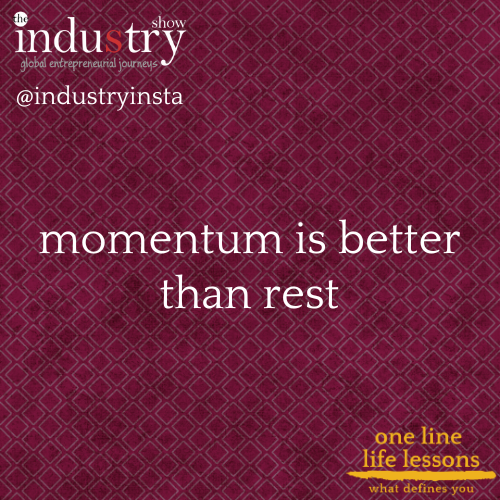
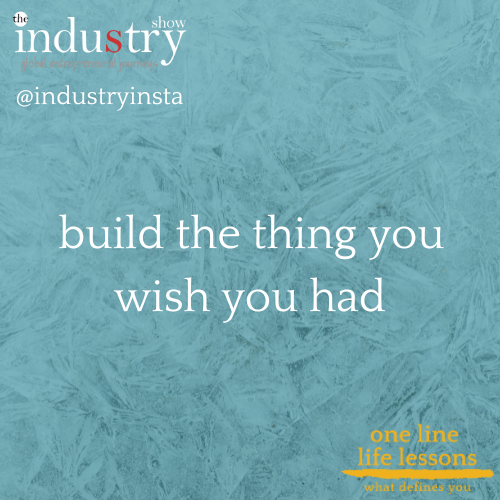
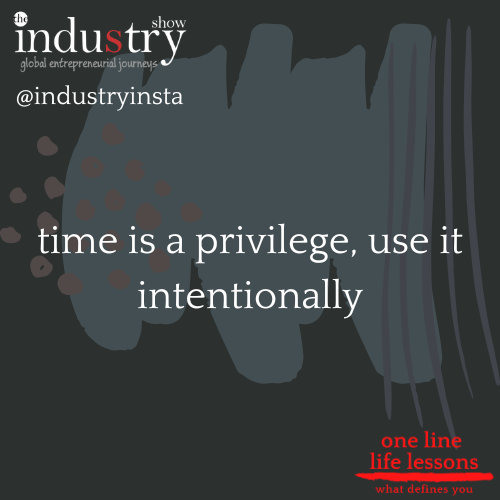
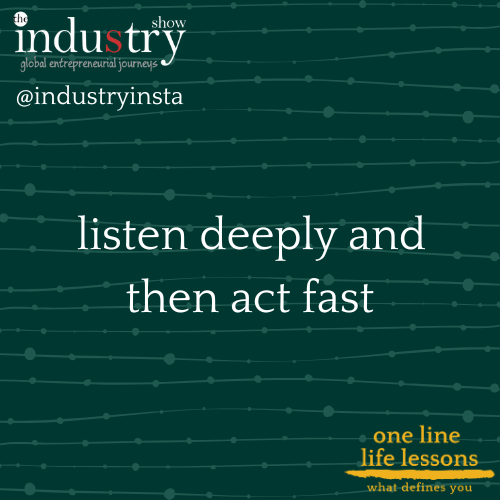
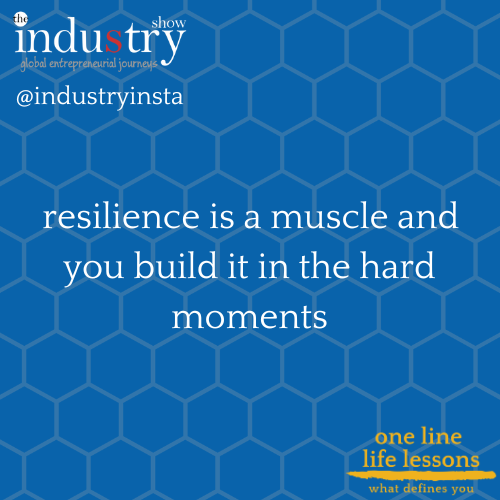
Episode Highlights
- Nitin Bajaj introduces Liesel Vaidya (0:00:00)
- Who is Liesel Vaidya? (0:00:11)
- What is Imera? (0:00:55)
- Imera’s impact and scale (0:03:26)
- Biggest challenge (0:05:36)
- Biggest opportunity (0:06:45)
- A time when things didn’t go as expected (0:08:37)
- A time when things exceeded expectations (0:08:46)
- What Liesel Vaidya does for fun outside of work (0:11:35)
- Book recommendation (0:12:51)
- One-line life lessons (0:13:58)
Show Transcript
Transcript - Full Episode
[00:00:00 – 00:00:08] Nitin Bajaj
Hey everyone. Welcome to the industry show. I’m your host, Nitin Bajaj. And joining me today is Liesel Vaidya. Liesel, welcome on the show.
[00:00:09 – 00:00:10] Liesel Vaidya
Thank you. Great to be here.
[00:00:11 – 00:00:14] Nitin Bajaj
Great to have you here. Let’s start with who is Liesel?
[00:00:15 – 00:00:44] Liesel Vaidya
Ooh. I’m Liesel. I’m a founder. I am an immigrant from Nepal. I built my first company on a student visa and went through a lot of challenges trying to do that. And I’m someone who likes building for deeply personal problems. And I think I’ve always gravitated towards building problem like solutions for life defining moments. And yeah, that’s a little bit about who I am.
[00:00:45 – 00:01:04] Nitin Bajaj
Yeah. And I’m looking forward to learning a little more of that. But really inspiring story. When I got to know you, got to know about you, I was very impressed, very inspired. Let’s talk a little more about what you have built. Tell us more about what is Imera? What does the name mean? And more importantly, why did you start it?
[00:01:05 – 00:03:13] Liesel Vaidya
Yeah, so starting with the name, actually Imera is a made up name. It’s a combination of immigrant and era together. So Imera, it’s five letters easy and the domain was available. Anyways. I started Imera because of again, deeply personal challenges that I faced in my own journey as someone who’s navigated life on a visa in the US for the past 11 years. I moved here from home for college and throughout that entire journey faced a lot of challenges like many others do. Didn’t know, like you don’t know what you don’t know. By the time you learn about your options, it might be a little too late. And every other decision felt like it could potentially alter my life trajectory. And yet the resources that I had that I relied upon to make those decisions or figure out what my options were. So fragmented, I had limited support. My brothers had both studied in the US a long time ago, 10 years before I did. But again, they weren’t here anymore and it was just so challenging. Even they had to go back home like after college because like visa issues. What Imera is a platform that supports people throughout their journey. If you were here on a visa. What we’ve built essentially is a platform that can provide personalized guidance throughout your journey. So we basically leverage AI to deliver that personalization. We also give you streamlined and digitized access to all types of essential services. So legal support, financial services, housing, health care, all these essentials that typically force a newcomer. Right. You don’t have credit histories or Social Security numbers, so it becomes really you face a lot of barriers to accessing basic things and it’s very manual. And then lastly, we also have community baked into every single thing that we do. It’s where we grew up. For a lot of us, we, we grew up in very large communities that supported us. And I think that’s something that we are trying to recreate in what we are doing and how we’re doing it.
[00:03:14 – 00:03:36] Nitin Bajaj
Fascinating. And like you said, building for your personal challenges, there’s always that emotional connect, that passion that takes you much further than if you were just doing it to make money. Give us a sense for. You’ve been doing this a couple years now. Give us a sense for the size and scale, more importantly, the impact able to create through Imera.
[00:03:36 – 00:04:43] Liesel Vaidya
Yeah, Imera is quite early in the same sense that we started working on the company about a year ago, like this time last year. Basically we’ve been live on the app and play stores for about two months now. So our is live. For anyone listening, you can go download our app and hopefully get a lot of value out of it. But in terms of the impact and the size, there’s over 40 million immigrants in the U.S. they make up quite a large percentage of the total population. And when you think about the impact that people on visas who’ve come here for school, for work, like I did have been able to make, like over 60% of all billion dollar companies were started by immigrants who first came here on visas. And they contribute so much from economic standpoint. And the people that we’re serving like they’ve come in through, they’re like the most highly vetted, like people essentially coming through the system as well. And essentially what we are trying to provide them is, okay, you’re here now, let’s help you navigate the rest of your journey a little bit easier.
[00:04:44 – 00:05:47] Nitin Bajaj
True. And we serve the same communities in many ways, except we have focused a little more on the South Asian community where we come from. And having been through that journey myself, came here as a student, graduated in 2008, which was probably one of the worst times to graduate. There were no jobs, there were no visas. And I truly appreciate what something like Imera brings to that student, to that immigrant who has left home and come here without a family, without the relatives, without the community, but with Amera now can come into a community and get a lot of the support that is extremely important as you’re starting over in a completely different land now. There is a lot that’s happening, especially in today’s time and age. Multiple challenges that not just the people you serve are facing, but you may be serving as a business owner. What’s the one big one that you would like to call out?
[00:05:48 – 00:06:44] Liesel Vaidya
There are so many challenges when you’re building a startup every single day. You’re trying to put up so many flaggers. I would say so there are so many. But I think for where we are in our journey right now, the biggest challenge is how do we spread the word about who we are and what we’re doing so that people again can benefit from what we are building and have built and getting to as many people as possible so we, we can help them and they can give us feedback so we can keep iterating and making our product better. I think that’s the biggest challenge that we’re trying to get across. And we’ve had the privilege of being able to partner with many different organizations to help get the word out there. Like even doing this show right now, like, hopefully that helps us reach a couple of more people than we would have on our own. But I would say, like, for many companies in early stages especially distribution is a challenge and that’s definitely something that we’re focused on.
[00:06:45 – 00:06:50] Nitin Bajaj
On the flip side of challenges come opportunities. What’s the one you’re most excited about?
[00:06:50 – 00:07:59] Liesel Vaidya
Oh, there’s quite a bit of opportunities, I would say. We started with. We are starting with a very consumer focus, going directly to people, allowing them download our app and use our app from the app stores. And there is a core reason for that. I believe throughout my journey, what I saw is that the right options, the this is what you need to do, was always gate kept behind. If you had the right network, if you were part of the right organization or this or like that. And at the end of the day, a lot of this is just information. And I want to build something that anyone, regardless of who you know or who you might not know or if like you have access to it, it’s just information. So that’s why we’re starting with a consumer approach. But going back to what we’re excited about is we’re also getting contacted by a lot of employers and organizations who see the value of providing what we provide to their communities and them paying for our services. That was something that we had planned for down, down the roadmap. Not very soon, but because of how much interest there is, we might be looking at that a little bit sooner.
[00:08:00 – 00:08:33] Nitin Bajaj
I love this journey that we as entrepreneurs go through, especially in the early days, where we think we have a plan and a roadmap. Then we start seeing traction in places where we do not expect sooner than later. And things that we are extremely confident on, those don’t take off as we expect. But I think what’s most valuable is to stay agile, listen to the needs and then just build to that. So I’m glad you’re doing that and you’re able to bring about some of those changes as you’re seeing some traction and value.
[00:08:34 – 00:08:36] Liesel Vaidya
Yeah, of course. All the time.
[00:08:37 – 00:08:58] Nitin Bajaj
Now I’d love to take you back in time, have you share two moments in your journey where things did not work out as you’d expected. There was disappointment, failure, lessons, another instance where things exceeded your own expectation and was a success beyond your imagination.
[00:08:59 – 00:10:24] Liesel Vaidya
I would say in terms of failures, I don’t know if it’s necessarily a failure, but it’s definitely a lesson learned. I can be a bit of a perfectionist, or I used to actually, because now I’ve learned and I’ve been a builder for the most part of my career and I was so focused previously on building the perfect product, waiting for it to be like, all the features need to like hit a certain leg point. This is how the product like all of that before you put it out there. And it took a while for me to learn the fact that as a founder you just need to put things out, like, even though they’re not ready. When you think about all the companies and platforms and tool that you use, like on a day to day basis, like they didn’t look like that when they first launched. And I think it was a lesson that I had to learn pretty quickly as I was starting out my career, especially when I was building my first company. And thankfully now I have the privilege of utilizing a lot of these lessons that I’ve learned in the past. And I can still be a bit of a perfectionist when it comes to like small things here and there. But on the grander scheme of things, I know that speed and getting to people while knowing that the vision in your head does not match the reality quite yet. Like you can get there and, and taking the community alongside you is might be the best path for you.
[00:10:25 – 00:10:40] Nitin Bajaj
Kudos for you for learning that pretty quickly. I still struggle with that. It’s just. No, it can’t be. But you have to push yourself and have a team that’s around you that pushes you to go ahead and do it and ignore the perfection. So kudos to you.
[00:10:40 – 00:10:41] Liesel Vaidya
Yeah.
[00:10:41 – 00:10:42] Nitin Bajaj
What a success.
[00:10:43 – 00:11:17] Liesel Vaidya
Oh, there are so many successes. I would say I think the biggest thing is for me has Been finding the right people to work with, building the right team. And when you’re surrounded by the right people, one, you enjoy doing what you do 10x100x. But then the amount of you’re able to share the challenges and I think the burden feels a little less burdensome when it gets heavy. And the wins are even better when you’re celebrating with a team that cares just as much about the problem as you do.
[00:11:17 – 00:11:29] Nitin Bajaj
So true. It’s. At the end of the day, it’s all about the people. Right. Having the right ones makes things so much easier. They don’t become easy per se, but just having the right company.
[00:11:30 – 00:11:30] Liesel Vaidya
Yeah.
[00:11:30 – 00:11:32] Nitin Bajaj
The journey more enjoyable.
[00:11:32 – 00:11:34] Liesel Vaidya
Yeah, exactly.
[00:11:35 – 00:11:38] Nitin Bajaj
Now, outside of work, what do you do for fun?
[00:11:39 – 00:12:49] Liesel Vaidya
Oh, okay. I started taking up hot yoga about two years ago. I’ve never been like, I’ve been. I’ve. My entire life, I’ve been really inconsistent with working out. Like, I need a lot of external motivation to get myself out to do something, like, consistently in terms of working out. But hot yoga has been a game changer for me. So I try to go to a class like a couple of times a week. I think last year I did over 100 classes. I also love, like, I live in New York City. I love to visit galleries, museums, just spend time in creative spaces. I value things that have a story behind them where it’s. There’s intentionality behind little things. And I’m also very grateful that I have a lot of friends who don’t work in tech and work in very different industries, so I get to see life through the lens as well. And yeah, and again, the last thing here is also, even though the most of my family, my parents are back home in Nepal, I do have my brother and my niece here. So I also love spending time with them. So I think outside of work, like, those are mostly the things you’ll catch me doing.
[00:12:50 – 00:12:56] Nitin Bajaj
Love that. Is there a book or a podcast that you enjoy or you would love to recommend?
[00:12:57 – 00:13:29] Liesel Vaidya
Oh, I recently finished reading Zarna Garg’s book, this American Woman. So we actually did an event with her for New York Tech Week this year, and she is phenomenal. Like, she’s hilarious. And I finished reading her book recently and it was unexpected. Like, for someone who brings so much joy, like making people laugh all the time, I didn’t expect her life story to be just drastically different. And yeah, it was amazing. In general, I love reading like memoirs and people’s life stories.
[00:13:30 – 00:13:37] Nitin Bajaj
Very cool. And I’ve often found perceptions and the realities tend to Be very different if you feel the layers.
[00:13:37 – 00:13:37] Liesel Vaidya
Yeah.
[00:13:38 – 00:13:50] Nitin Bajaj
There’s a completely different person behind that Persona. And that’s one of the reasons why we do this show is, you know, there’s many forums where you can talk as the CEO, as the founder, and talk about the business.
[00:13:50 – 00:13:51] Liesel Vaidya
Yeah.
[00:13:51 – 00:13:55] Nitin Bajaj
We wanted to peel the layers and get to know the person behind the Persona.
[00:13:55 – 00:13:56] Liesel Vaidya
Yeah, I love that.
[00:13:58 – 00:14:05] Nitin Bajaj
Now onto. My favorite part of the show is that I would love for you to share your one line life lessons with us.
[00:14:06 – 00:16:24] Liesel Vaidya
Okay. One that I learned, and I think this is some something that someone said to me while I was exploring what I wanted to do next before I ended up starting this company. And I think I was, like, reaching that point where I knew I was ready to start doing something else in life, something big. And this person said, momentum is better than rest. I think that, like, rings true every single time you’re feeling anxious, you’re feeling this, you’re feeling that. Create momentum for yourself. Momentum is always better than rust. And that’s 1, 2. And this rings true for Imera, the company that I’m building now and why I’m building it, which is build the thing you wish you had. So it’s really solve your own problems. And hopefully that’s actually you’re solving a wider problem in general, but build the thing that you wish you had. That’s why I’m building Amera. And it’s a problem, unfortunately, that many others have faced as well. Also related to Imera, another lesson is the fact that time is a privilege. Use it intentionally. Right. Related to Amera, because I feel like people on visas, time is a privilege for anyone on a visa. You don’t have all the time in the world and the decisions you need to make, like, you need to make them very fast. But also, I recently attended a funeral, and I think it’s. It was the first one that I’ve attended in my adult life, and it really made me reflect back on what’s important in life. We spend time with what you do with the time you have left. So that’s a big one. Another one that’s important for, I think, founders for sure, but also in general is listen deeply and then act fast. I think listening is so important. Most people, they love talking and sharing their opinions, but I think being able to listen deeply and then being able to act fast on what you understand from it and learn from it, I think that’s really important. And maybe one last one, resilience is, I think, a muscle, and you build it in the hard moments. Right? And I think that’s it. Those are my life lessons.
[00:16:25 – 00:17:05] Nitin Bajaj
So much wisdom. So beautifully said. Liselle. I cannot applaud you enough for who you are and how deeply you think about these things, especially the ones that impact you and can have a larger impact on the community. Congratulations on your successes so far, and I know you’re just getting started. Really appreciate the work you do for our community and would love for you to come back on and share more of your successes and more of your journey with us. But thank you for sharing your journey and story with us and your life lessons. We really appreciate it.
[00:17:06 – 00:17:16] Liesel Vaidya
Thank you for having me on. And again, like, allowing people like me to share our stories, amplify them, and also just doing the work that you do. Very appreciative.



